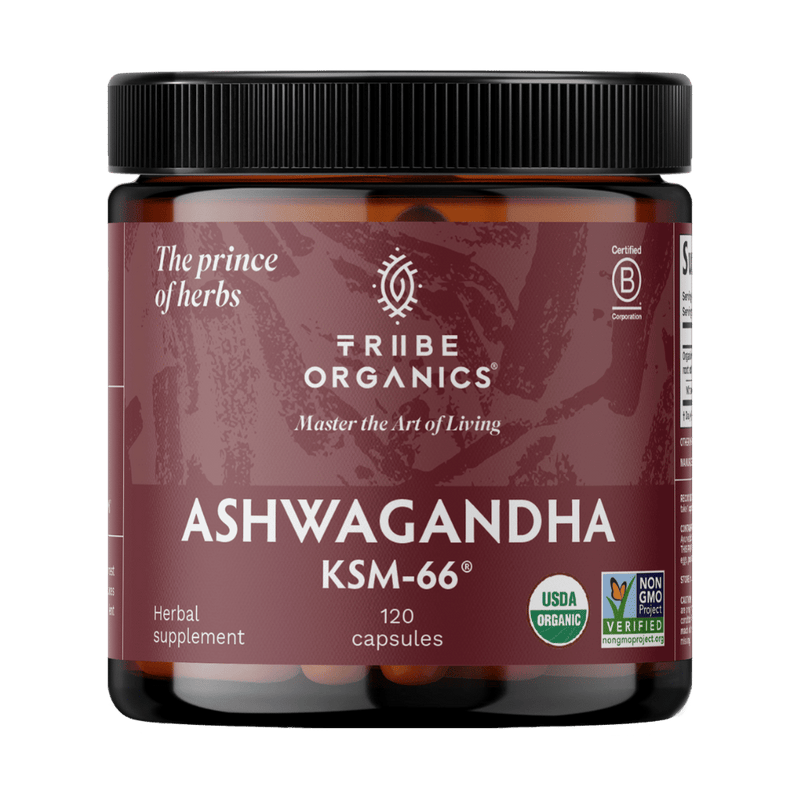Start your day with a delicious morning elixir, a brain booster mushroom-adaptogen latte.

If your local coffee shop isn’t serving these kinds of tonics just yet, you can make your own mushroom-adaptogen latte at home. This will require some TRIIBE products and other high-quality powders along with your favorite plant milk and other wellness staple ingredients.
This brain boosting recipe contains Lion’s Mane mushroom, which is often referred to as the “smart mushroom", we like to cal it "the brain booster". It is one of the only mushrooms with neuroprotective properties and contains large amounts of compounds called erinacines, which stimulate the production of nerve growth factor (NGF). NGF is prevented from entering the brain by the blood-brain barrier, which is why it’s so important for the brain to synthesize the protein on its own to help protect against degeneration and maintain optimum function.
It also contains Ashwagandha, another incredible ingredient. This is an adaptogen that has shown to be incredibly helpful for our thyroid, providing cortisol support. Cortisol is also known as our stress hormone and when we find ways to support this hormone, we can in fact help our body adapt to stress. This herb helps with our adrenal glands as well. These are responsible for releasing the hormones adrenaline and cortisol in response to stress from the body. If your adrenals are overtaxed, this can lead to adrenal fatigue which in turn disrupts your hormones and lowers your DHEA, causing you to age faster.
Ready to boost your day?
INGREDIENTS
- 1 cup of your favorite milk (almond, coconut, soy, cashew). I used home-made almond milk
- 2 TRIIBE Organics Ashwagandha Capsules
- 3 TRIIBE Organics Lion’s Mane Capsules
- 1/2 tsp Maca powder (optional)
- 1 tsp coconut oil
- 1/2 tsp vanilla or almond extract
- Raw honey to taste optional and/or add a pinch of cinnamon
INSTRUCTIONS
- Heat your milk in a small pot on the stove over medium heat.
- Once heated through, add to your blender and add all the other ingredients, blend on high for 30 seconds, or until latte is frothy.
- Serve and add any additional toppings like cinnamon or cacao powder or cacao nibs.
Remember that this recipe is easily adaptable and can be made with whatever you may have in your kitchen. Feel free to add in ginger, cacao powder or other adaptogens to make the most delicious mushroom tonic ever.
MEDICINAL MUSHROOM HEALTH BENEFITS
Mushrooms have long been touted for their health benefits. Along with being the only non-animal source of beneficial vitamin D (they're fungi), mushrooms are loaded with nutritious healing properties, vitamins, and minerals. This includes being a superior source of Beta-Glucan, a beneficial type of fiber with serious immune support.
Beta-Glucans in mushrooms are considered immune modulating, meaning they can regulate certain immune responses in the body. In fact, these beneficial fibers are known to help produce and activate immune cells that help to ward off disease and infections.
Mushrooms possess anti-cancer and anti-inflammatory properties, boost the immune system, provide protein, and contain beneficial antioxidants. They are also considered to be adaptogens, or substances that help the body adapt to stress and hormone fluctuations.

WHAT ARE ADAPTOGENS?
Adaptogens are herbs, roots and mushrooms that help the body cope with physical and mental stress. They’ve been used for thousands of years in Chinese and Ayurvedic medicine and are now becoming more popular as a natural way to help manage stress and anxiety.
They work by strengthening and stabilizing our adrenal glands, which when we are stressed pumps out adrenaline and cortisol. These hormones naturally raise our blood sugar and increase our heart rate. This is great if the stress is short-lived, but in reality, we tend to be faced with constant stress. This constant stress leads to a consistent output of stress hormones which can lead to weight gain, inflammation, and chronic disease.
Shop best sellers
Explore our collection of favorite items that have gained popularity for their quality and satisfaction.























